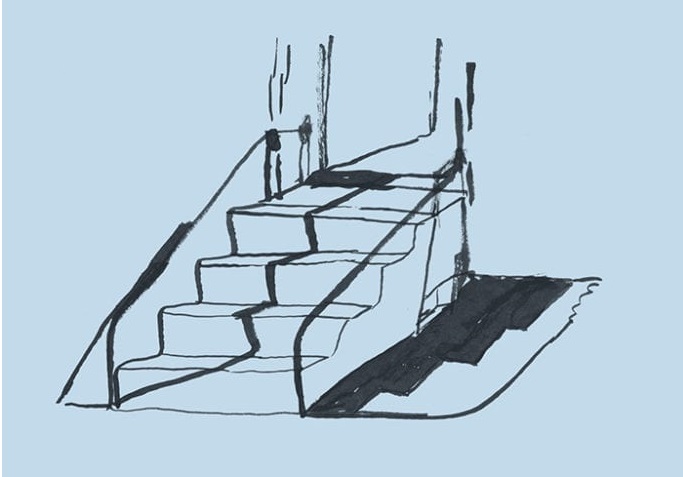The penultimate poem in Great Exodus, Great Wall, Great Party, winner of the APR/Honickman First Book Prize via The American Poetry Review, is a short piece that ends with a brusque suggestion: “You could write things down just as they are, / just as you see them. You could try that.” Were it that easy! Yet for poet Chessy Normile, it may be just so. The poems in her debut collection feel effortless without sacrificing profundity, spinning insight and humor from the grist of mundane moments and errant thoughts.
Normile’s voice and peculiar subject matter are both familiar and fresh, and reading her is not unlike reconnecting with your cleverest friend after years apart. She recounts memories, quotes other texts, relates dreams, and touches on subjects of personal interest (the nature of geologic time, or an odd Bible story), sometimes all within a single poem. There’s a friendly, unaffected openness in her language: “I am 1,000 times more shattered / than I have ever been before / barring like ten other times.” Normile’s poems lack any sense of the posturing and pretense that can plague lyric poets. Nothing here is overwrought. Instead, she shoots from the hip, relying on spontaneous jumps of logic and reason that sometimes surprise even herself.
There’s a friendly, unaffected openness in her language: “I am 1,000 times more shattered / than I have ever been before / barring like ten other times.”
The danger of this plainspoken, freewheeling mode is that it threatens to tip into being too “cute,” becoming what one Amazon reviewer derides as “jejune ramblings.” But I must oppose this web-critic: far from an aimless ramble, Normile’s frankness and penchant for meandering bely the complexity of these poems as a project. The desire to understand how all these things are connected is the guiding impulse that draw us through the swerving detours. After connecting two seemingly loose threads, she writes, “I’m not saying these are facts. / I am just saying ‘what if.’” What if these disparate ideas are connected—deeply connected—to our personal lives, to our friendships and our loves, in ways we’ve previously ignored? What if we can hold them up to the light and glimpse something truly novel, just for a moment? Normile’s is a poetics built on the tension of the possibility of knowing, as tantalizing as it is unresolvable.
This approach may sound navel-gazey, but Normile grounds her poems in highly tactile, imagistic moments, like when she writes, “I watched you find the spoon / break it apart from the table / and lift it up to the light.” It’s a delicate, direct image made real by the verb; the spoon isn’t merely picked up from the table, it’s “broken apart” from it, and the whole stanza becomes like a painting that suddenly moves. Elsewhere, friends’ names populate the pages, quoted or directly addressed (“Stop lying about your hair, Andy,” commands one poem). If the word stanza has roots in the word room, this book is a breezy studio with an open-door policy: people summoned and barging in, gazing out windows, sharing a memorable line as Normile reminisces.
Normile’s is a poetics built on the tension of the possibility of knowing, as tantalizing as it is unresolvable.
It also helps that this poet is funny as hell. She possesses a unique wit, quick to turn a phrase on its head or yank the rug out from beneath the reader: “When worse / comes to worst / in pain / and worst says / all right, come in.” Or, in a dreamy deviation: “you poured / champagne into a flute and I was like, / He just ruined that flute.” Permit me to quote a couple more, at the risk of being a book-spoiler: “Being and Nothingness is a book / about phenomenological ontology. // Now you don’t have to read it, / you’re welcome.” And: “All you fuckers with your sex lives / and your central air and your Hamlet…” The hits just keep coming, every page. For how minimal the poems feel and for how dark they can get, the punchline density is relentless.
And they certainly can get dark. It’s not all lovely memories and word games. A couple of violent, traumatic experiences form a kind of through-line, rearing their heads in multiple poems: “Right now, in the school library / holding my place in a book / on The Secret Art of Alchemy / nobody’s raping me. Superb!” Still funny, yet darkly so.
The undercurrent of these traumas sits just beneath the surface, and when they bubble up, they’re the only moments where the poet’s directness falters. Instead, they’re referenced obliquely, crossed out, joked about, or self-redacted, with only the final poem providing something like closure, or as close to closure as this artform allows.
This is the vulnerable core that fuels the book—not the traumatic experiences themselves, but the way the poet generously renders the world in spite of their presence. I’m left no longer wondering how an exodus is like a wall is like a party. In Normile’s eyes, they’re all great.
(American Poetry Review, September 2020)
You can keep up with Chessy’s work at https://www.chessynormile.com/.
August Smith is a poet, publisher, musician, and game dev living in Austin, TX. You can find links to his work, including more poetry book reviews, here: http://august.mostlymidwest.com/.
